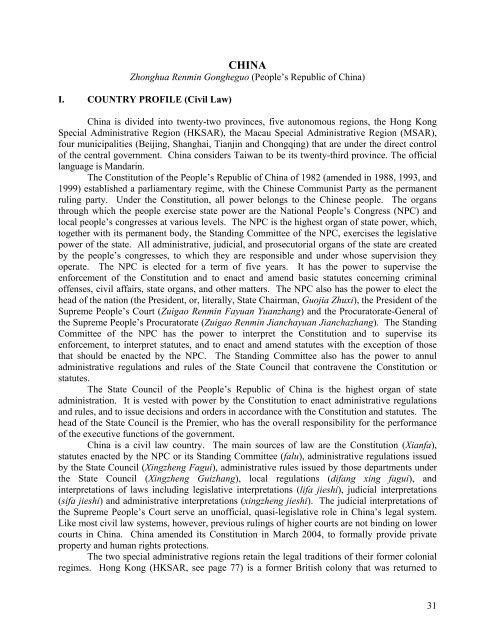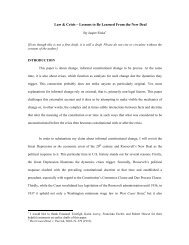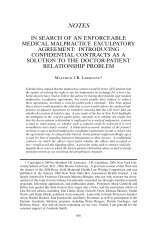Guide to Foreign and International Legal Citations - New York ...
Guide to Foreign and International Legal Citations - New York ...
Guide to Foreign and International Legal Citations - New York ...
Create successful ePaper yourself
Turn your PDF publications into a flip-book with our unique Google optimized e-Paper software.
CHINA<br />
Zhonghua Renmin Gongheguo (People’s Republic of China)<br />
I. COUNTRY PROFILE (Civil Law)<br />
China is divided in<strong>to</strong> twenty-two provinces, five au<strong>to</strong>nomous regions, the Hong Kong<br />
Special Administrative Region (HKSAR), the Macau Special Administrative Region (MSAR),<br />
four municipalities (Beijing, Shanghai, Tianjin <strong>and</strong> Chongqing) that are under the direct control<br />
of the central government. China considers Taiwan <strong>to</strong> be its twenty-third province. The official<br />
language is M<strong>and</strong>arin.<br />
The Constitution of the People’s Republic of China of 1982 (amended in 1988, 1993, <strong>and</strong><br />
1999) established a parliamentary regime, with the Chinese Communist Party as the permanent<br />
ruling party. Under the Constitution, all power belongs <strong>to</strong> the Chinese people. The organs<br />
through which the people exercise state power are the National People’s Congress (NPC) <strong>and</strong><br />
local people’s congresses at various levels. The NPC is the highest organ of state power, which,<br />
<strong>to</strong>gether with its permanent body, the St<strong>and</strong>ing Committee of the NPC, exercises the legislative<br />
power of the state. All administrative, judicial, <strong>and</strong> prosecu<strong>to</strong>rial organs of the state are created<br />
by the people’s congresses, <strong>to</strong> which they are responsible <strong>and</strong> under whose supervision they<br />
operate. The NPC is elected for a term of five years. It has the power <strong>to</strong> supervise the<br />
enforcement of the Constitution <strong>and</strong> <strong>to</strong> enact <strong>and</strong> amend basic statutes concerning criminal<br />
offenses, civil affairs, state organs, <strong>and</strong> other matters. The NPC also has the power <strong>to</strong> elect the<br />
head of the nation (the President, or, literally, State Chairman, Guojia Zhuxi), the President of the<br />
Supreme People’s Court (Zuigao Renmin Fayuan Yuanzhang) <strong>and</strong> the Procura<strong>to</strong>rate-General of<br />
the Supreme People’s Procura<strong>to</strong>rate (Zuigao Renmin Jianchayuan Jianchazhang). The St<strong>and</strong>ing<br />
Committee of the NPC has the power <strong>to</strong> interpret the Constitution <strong>and</strong> <strong>to</strong> supervise its<br />
enforcement, <strong>to</strong> interpret statutes, <strong>and</strong> <strong>to</strong> enact <strong>and</strong> amend statutes with the exception of those<br />
that should be enacted by the NPC. The St<strong>and</strong>ing Committee also has the power <strong>to</strong> annul<br />
administrative regulations <strong>and</strong> rules of the State Council that contravene the Constitution or<br />
statutes.<br />
The State Council of the People’s Republic of China is the highest organ of state<br />
administration. It is vested with power by the Constitution <strong>to</strong> enact administrative regulations<br />
<strong>and</strong> rules, <strong>and</strong> <strong>to</strong> issue decisions <strong>and</strong> orders in accordance with the Constitution <strong>and</strong> statutes. The<br />
head of the State Council is the Premier, who has the overall responsibility for the performance<br />
of the executive functions of the government.<br />
China is a civil law country. The main sources of law are the Constitution (Xianfa),<br />
statutes enacted by the NPC or its St<strong>and</strong>ing Committee (falu), administrative regulations issued<br />
by the State Council (Xingzheng Fagui), administrative rules issued by those departments under<br />
the State Council (Xingzheng Guizhang), local regulations (difang xing fagui), <strong>and</strong><br />
interpretations of laws including legislative interpretations (lifa jieshi), judicial interpretations<br />
(sifa jieshi) <strong>and</strong> administrative interpretations (xingzheng jieshi). The judicial interpretations of<br />
the Supreme People’s Court serve an unofficial, quasi-legislative role in China’s legal system.<br />
Like most civil law systems, however, previous rulings of higher courts are not binding on lower<br />
courts in China. China amended its Constitution in March 2004, <strong>to</strong> formally provide private<br />
property <strong>and</strong> human rights protections.<br />
The two special administrative regions retain the legal traditions of their former colonial<br />
regimes. Hong Kong (HKSAR, see page 77) is a former British colony that was returned <strong>to</strong><br />
31
















